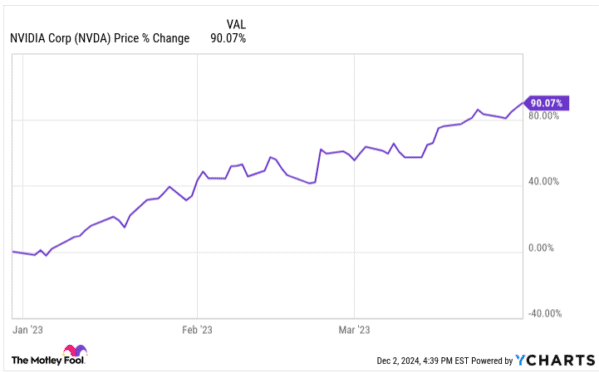This article was originally published on Fool.com. All figures quoted in US dollars unless otherwise stated.
Another year, another huge gain. That's what appears to be shaping up for Nvidia (NASDAQ: NVDA). Shares of the GPU maker are up big with only a few weeks remaining in the year.
It's too late for investors who don't own Nvidia to benefit from the stock's past performance. But should you buy Nvidia stock hand over fist before the end of 2024? Here's what history suggests.
An impressive Q1 track record
There's often no reason to hurry to buy a stock. Whether you purchase shares immediately or a few months later doesn't matter too much in many cases. However, it's been a different story with Nvidia.
The company conducted its initial public offering on January 22, 1999. In the nearly 25 years since then, Nvidia has delivered a positive return in the first quarter 20 times. The stock's average Q1 gain is an impressive 19%. If you waited until after the beginning of the year, you would have been poorer most of the time.
In 14 of Nvidia's 25 full first quarters since its IPO, the stock has delivered a double-digit percentage gain. The most impressive performance came last year when Nvidia's share price skyrocketed 90%. But the first quarter of 2024 ranks as the stock's second-best Q1 performance ever with a huge gain of 82.5%.

Granted, Nvidia has turned in some dismal Q1 performances. In the first quarter of 2008, the stock plunged roughly 42%. However, over the last 10 years, Nvidia has experienced only one negative first quarter with its shares falling around 7% in Q1 of 2022.
Expanding the horizon
Of course, most investors won't buy Nvidia shares before the end of a given year and then sell them three months or so later. How has the stock performed over longer periods?
Nvidia delivered a positive return in 17 of the 23 three-year periods since the company's IPO (including the period between 2022 and 2024). The average return for these three-year periods was around 195%.
But if you bought before the end of a given year and held onto the stock for five years, you'd really be sitting pretty. Nvidia's share price has risen in 19 out of 21 five-year periods since its IPO. The average return for these five-year periods was a staggering 551%.
What's the bottom line from a historical standpoint when it comes to buying Nvidia stock before the end of the year? It nearly always pays off handsomely.
Throw out the history books
Now for the bad news: There's a good case to be made that history doesn't matter much regarding investing in Nvidia. Why? The present is unlike the past.
Most of Nvidia's stellar performances in previous years came before the generative AI explosion. Interest rates were also much lower during the period when Nvidia delivered its greatest gains. Rivals are scrambling to develop chips that compete with Nvidia's GPUs. The stock's future returns may be significantly lower in the future as the supply of AI chips catches up with demand, interest rates remain higher (relatively speaking), and competition intensifies.
However, there's also an argument that Nvidia's future could be even brighter than its past. CEO Jensen Huang believes that the company's new Blackwell GPU architecture could become the most successful product in not only Nvidia's history but in "the history of the computer." Importantly, Nvidia is now on a yearly cycle of launching new chips, so even more powerful GPUs will be on the way after Blackwell.
AI is still only in its early innings. New advances, potentially including artificial general intelligence (AGI), could boost Nvidia's growth like never before. Even if we eliminate AI altogether, the company could have a $1 trillion opportunity as organisations shift from general-purpose computing to accelerated computing.
If you think Nvidia's growth prospects will improve (and there's good reason to do so), throw out the history books: Buying this stock hand over fist before the end of the year makes perfect sense.
This article was originally published on Fool.com. All figures quoted in US dollars unless otherwise stated.









